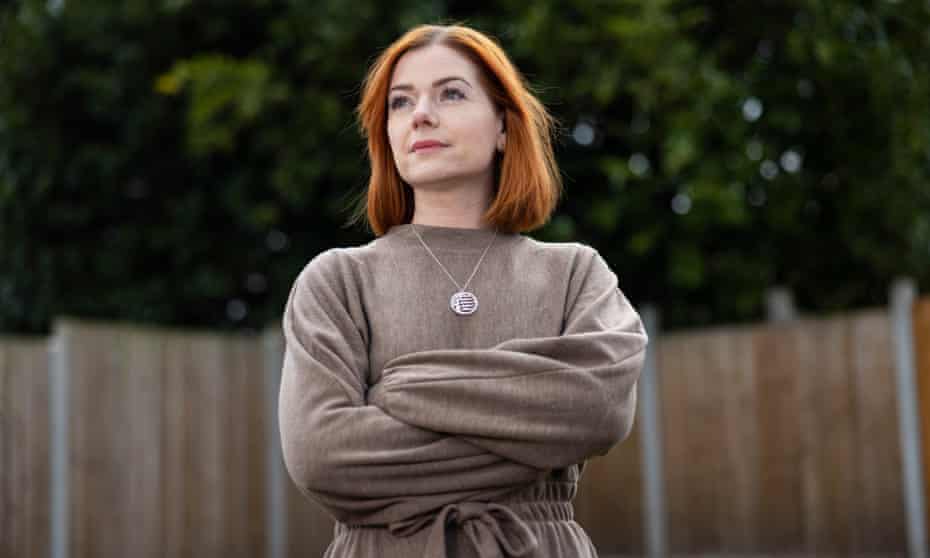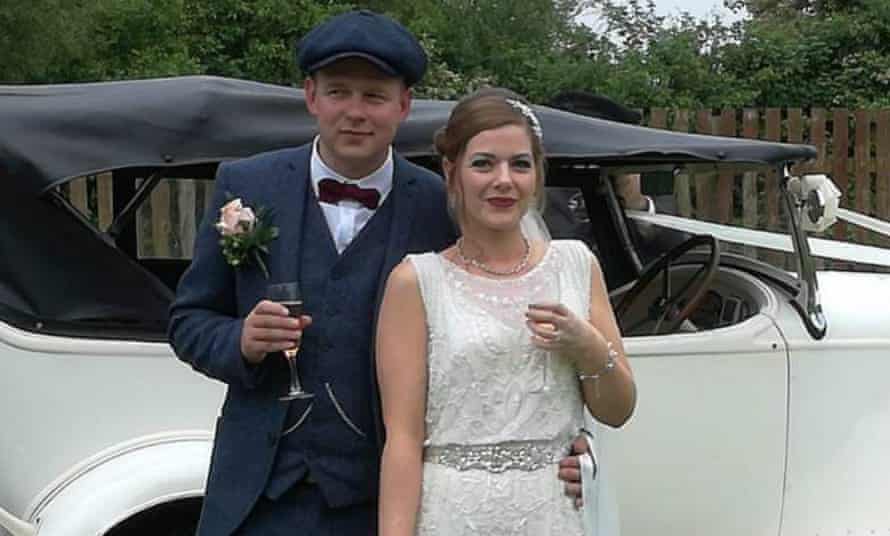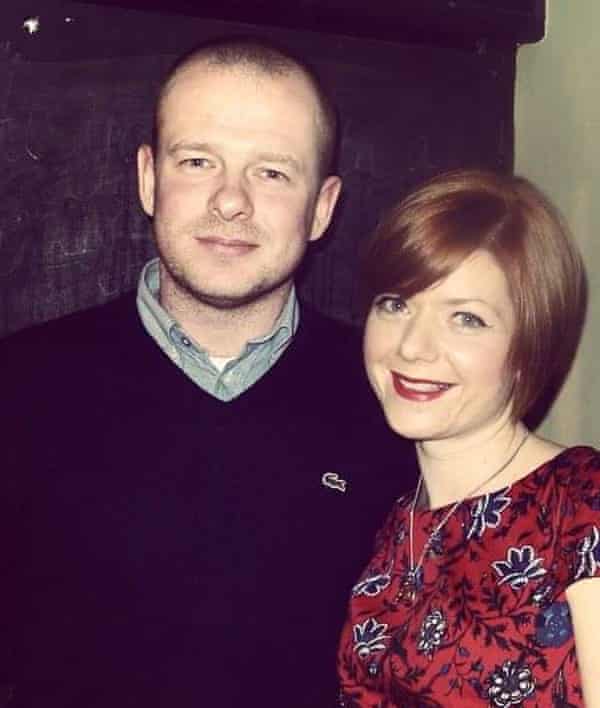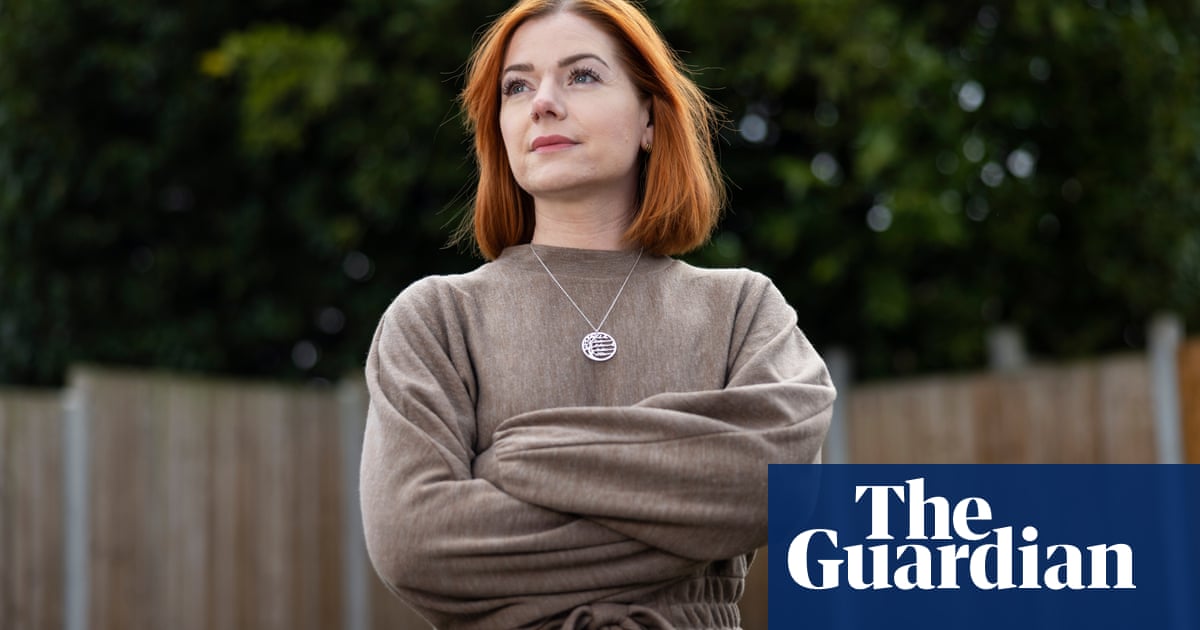‘I don’t want what happened to my husband happening to anyone else’: the widow campaigning for gambling law reform

It was only after Annie Ashton’s husband Luke took his own life that she realised he had been gambling in secret – sometimes up to 100 times a day on his phone. She wants urgent changes to the way the betting industry operates
In 2019, Annie Ashton’s husband, Luke, closed all his online betting accounts. He confessed to her that he’d lost more money than they could afford and swore his gambling days were over.
“Luke said he wouldn’t gamble any more and I fully thought that was what was going to happen – I think Luke did too,” says Ashton. “We thought it was like a switch that could be turned off. We were very naive.”
The couple cleared Luke’s debts with some money they had earmarked for renovating their home in Leicester, and life with their two children, returned to normal. But, the year after, Luke was furloughed from his job as a warehouse manager at a printing firm because of the pandemic, and he began gambling again – this time in secret. Ashton remained unaware, until April last year, when her husband – usually careful with money and “careful with everything, really” – took his own life.
It wasn’t until Luke’s phone was returned to her by the police that she saw any evidence that his gambling addiction had returned. “There was nothing to show in his bank account, but I was able to log in to his other accounts, including his PayPal. You could only see the last six months of transactions, but the first one I could see was a free bet.”
So-called “free bets” are offered by bookmakers to entice customers, allowing them to place a bet without depositing any cash. But, even if a customer wins on a free bet, there’s usually a catch.
“You often have to play free bets many times before you’re actually able to withdraw money,” says Nick Harvey, head of external affairs at the charity Gambling With Lives. “So, if you’re given a £50 free bet or bonus, you might have to bet 30, 50, even 100 times its value before you are able to withdraw any winnings. That’s one reason why they’re so closely linked with addiction.”

Ashton believes it was a free bet that caused Luke’s addiction to spiral for the first time in 2019. “Gambling was never an issue initially: we went to bingo a couple of times and he would place bets on the football at the weekend, but he never won anything. When he’d bet on Leicester [the football team he supported], they would lose – so he wouldn’t bet when they played.”
When Luke’s co-workers started betting on horse racing, Luke opened online accounts using free bet incentives – and ended up taking out loans to cover his losses. Since his death, Ashton has been campaigning for the implementation of Luke’s law, which would place a ban on free bets and email incentives; last year, her petition received more than 31,000 signatures.
“The idea that he was being encouraged and rewarded for doing something that would potentially kill him is hard to swallow,” she says. “If there had been interventions on the gambling sites, rather than incentives, then perhaps he would still be here.”
In 2021, a Public Health England report estimated that there are more than 409 gambling-related suicides in England every year – more than one death a day. Last week, a study by the UK gambling charity GambleAware found that gambling addiction rates may be nine times higher than the betting industry claims – which the Betting & Gaming Council (BGC) have denied – with 1.4 million people harmed by their own gambling, and a further 1.5 million at risk. (It should be noted that GambleAware is often criticised because most of its funding comes from the gambling industry, although it describes itself as “accountable to the Charity Commission” and “guided by an entirely independent board of trustees, the majority of whom work within the public health sector”, as well as having “robust governance processes in place to ensure the gambling industry has absolutely no influence over any of our work”.) The BGC disputes these figures, pointing to recent research from the Gambling Commission, which found that “the rate of problem gambling is 0.3% – down from 0.6% 18 months ago”.
Part of the problem is that legislation governing the gambling industry is woefully outdated: the Gambling Act of 2005 actually liberalised gambling laws, with a view to driving economic benefits. The act came into force in 2007, which, as Harvey says, was the year the first iPhone was released. Lawmakers “didn’t anticipate how big online gambling would get, and the fact that everyone could have a supercasino in their pocket,” he says. “It’s since those laws changed that suicides have rocketed.”
In 2020, a House of Lords select committee found that the gambling industry spends £1.5bn a year on advertising, and that 60% of its profits come from the 5% who are already “problem gamblers”, or are at risk of becoming so. The BGC disputes this claim, saying it is a “a deliberate distortion of the findings of two separate unconnected studies”. A spokesperson also stated that: “The BGC’s largest members committed to spend an additional £100m for the treatment of problem gambling, including treatment for a minority of those who are suffering from serious addiction, between 2019 and 2023.”
The Gambling Commission, which works to “raise standards in the gambling industry, protect children and the vulnerable and keep crime out of gambling”, also released a report in February, which found that “problem gamblers” were offered considerably more incentives, such as free bets, than other gamblers, with 35% reporting that they received incentives (via text message, app notification, email or targeted advertising online) every day.
“The gambling industry puts the responsibility on the people who are most vulnerable, when the way they advertise is actually quite predatory,” says Ashton. “They expect people to be able to withdraw [from gambling] while they’re using every trick in the book to draw them in.”
The government pledged to review gambling laws in its 2019 general election manifesto and a white paper was initially expected before the end of 2020, but, due, in part, to a ministerial reshuffle, it has been repeatedly delayed and is now expected in May.
“I don’t want what happened to Luke to happen to anyone else,” says Ashton. “The delays to the white paper mean there will be plenty more people suffering.”
Ashton joins a growing number of voices demanding an urgent overhaul of the gambling laws, alongside Gambling With Lives co-founders Charles and Liz Ritchie, whose 24-year-old son Jack took his own life, after developing a gambling addiction as a teenager. Last November, Ashton met the secretary of state for digital, culture, media and sport, Nadine Dorries, as well as gambling minister Chris Philp and Iain Duncan Smith, and in February this year her petition calling for the immediate publication of the white paper, received more than 5,000 signatures in less than two weeks.
She has also been in touch with Leicester City football club, to ask it to reconsider its in-stadium advertising. “Luke used to take our son Ollie to the football on the home games, and I wanted to keep the tradition going – but, when we went, Ollie picked up on the gambling ads that were flashing around the pitch straight away,” she says. “He literally sank into his seat. We’ve stopped going because it was just a constant reminder. The ads do have an impact on people – you hear it in the conversations. ‘I’ve put this on, I’ve put that on, I’m cashing out.’ It’s so embedded and normalised in sports – you can’t get away from it.”

In 2019, further research commissioned by GambleAware found that problem gamblers were six times more likely to have suicidal thoughts or try to take their own life. Ashton is acutely aware that gambling addiction equates to much more than just financial losses, since “some of the bets which Luke was placing were for less than £1, but it was the frequency with which he was placing them. There were days when he was betting more than 100 times a day on his phone.”
Much of Ashton’s campaigning focuses on the impact gambling can have on mental health. “You wouldn’t blame someone for getting an illness,” she says, “so why are we blaming people who have a gambling disorder, which is an illness?”
Harvey agrees that there is a lot of shame associated with gambling, something that he says is “exacerbated by the ‘gamble responsibly’ narrative pushed by the industry and GambleAware. It’s advertised as just a normal, fun thing to do – and if you’ve got a problem with it, they imply, that means there’s a problem with you.”
An inquest may eventually explore the role of gambling in Luke’s death but, to date, Ashton has not received any apology or acknowledgement from the gambling industry or the sites he used. A BGC spokesperson said: “Any suicide is a terrible tragedy and we are not in any position, nor would it be right, for us to comment on any individual case. As the mental health charity Mind and others acknowledge, the reasons behind any suicide are ‘complex and can have lots of different causes’.”
“The industry makes its profits from the vulnerable and we know they target those people with free bets,” Ashton says. “It needs to be held accountable It’s profits over people. Luke would be proud of the campaigning I’ve done so far – but he wouldn’t be surprised.”
-
Anyone concerned about their gambling, or that of a loved one, can visit BeGambleAware.org for free, confidential advice and support. The National Gambling Helpline is available on 0808 8020 133 and operates 24 hours a day, seven days a week.
-
In the UK and Ireland, Samaritans can be contacted on 116 123 or email [email protected] or [email protected]. In the US, the National Suicide Prevention Lifeline is 1-800-273-8255. In Australia, the crisis support service Lifeline is 13 11 14. Other international helplines can be found at www.befrienders.org.
- Gambling
- The outspoken
- Mental health
- Health & wellbeing
- features
